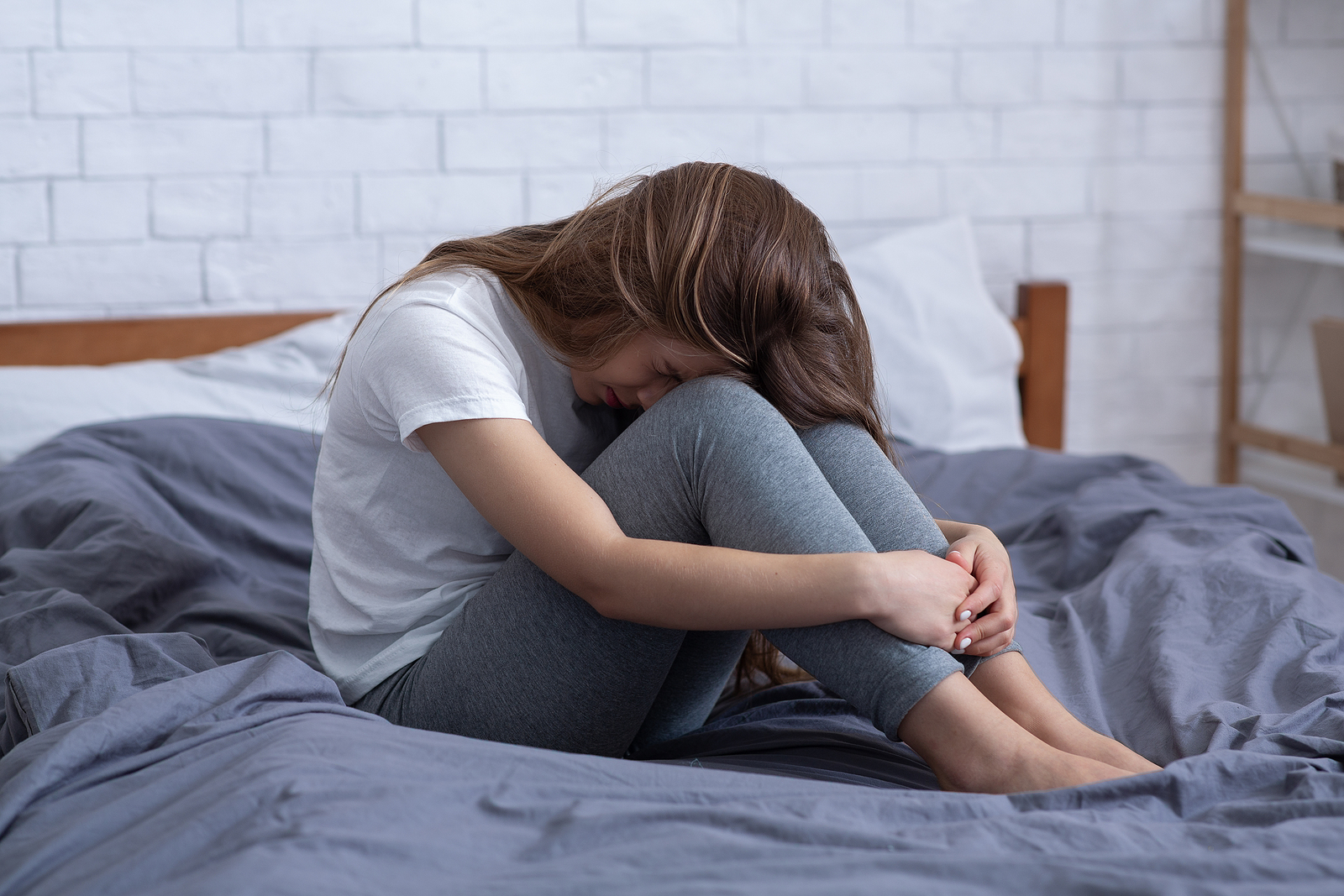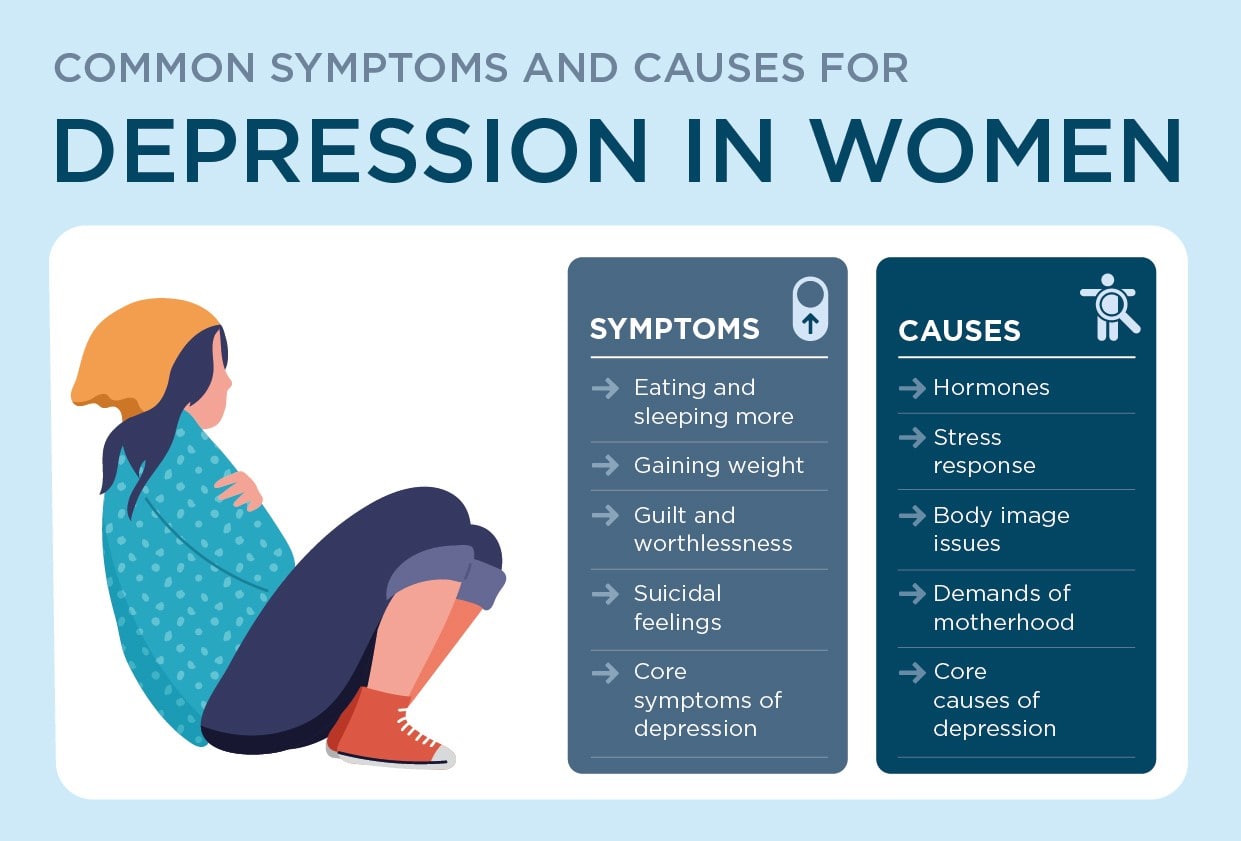
Key facts
- Depression is a common mental health condition that affects how you think, feel and behave.
- Depression is more common in women than men.
- Women may experience depression in response to life events including pregnancy and birth, as well as stress at work and relationship difficulties.
- Around 1 in 6 women will experience depression during their lifetime.
- Depression can be treated with self-help strategies, psychological treatments and antidepressant medicines.
What is depression in women?
Depression is a serious mental health condition that affects how you think, feel and behave. While everyone feels sad or down from time to time, depression lasts longer and may affect many parts of your life.
Depression is more common in women than men for a range of reasons. Many women are the people caring for others, sometimes at the cost of their own health and wellbeing. While women are more likely to experience depression, they are also more likely to reach out for help and support. This is an important first step in overcoming depression.
This page is about depression in women; however, many aspects and risk factors of depression are not age specific.
How common is depression in women?
Depression and other related mental health conditions, such as anxiety and post-traumatic stress disorder (PTSD), are especially common in women.
About 1 in 6 women in Australia will experience depression during their lifetime. Depression during and after pregnancy is also very common, with up to 1 in 10 women experiencing depression while pregnant, and 1 in 6 women experiencing depression during the first year after birth.
What causes depression in women?
Some people become depressed for no obvious reason. Others can see factors in their background or life circumstances that may contribute to their thoughts and feelings.
There are many different factors that can contribute to depression, including:
- family history (genetic factors)
- brain chemistry
- physical health problems
- personality style
- long-term stresses (such as relationship stress, work-stress)
- stressful or traumatic events
Women are more likely to experience situations that trigger or worsen depression, including:
Caring roles — More than 2 in 3 women are primary carers for children, parents and partners. Balancing caring roles with other responsibilities can impact on a woman’s physical and mental health.
Violence or abuse — Many Australian women have experienced violence or abuse by an intimate partner. This often negatively affects a woman’s health and wellbeing.
Infertility and miscarriage — Many Australian couples face infertility and experience perinatal loss. This can be very painful, especially since these losses are often mourned privately. Women with a strong desire to have children can find these events especially stressful.
Pregnancy and birth — Up to 1 in 10 women experience depression during pregnancy, and 1 in 6 women develop depression during the first year after giving birth.
Menopause — Hormonal changes and many life transitions that take place around menopause increase a woman’s chance of developing mental health issues, including depression.
The COVID-19 pandemic has also significantly impacted on women’s mental health, with more women than men reporting mental distress. This is because of many factors including work stress and insecurity, and an increase in household responsibilities and caring roles, the majority of which are still done by women.
What are the signs of depression in women?
It’s important to remember that we all go through times of feeling sad and not feeling good about ourselves. However, if this continues for more than a few weeks, you may be depressed. Symptoms between women with depression vary greatly. Some have only a few symptoms, while others may have many.
Women and men experience depression slightly differently. Women are more likely to:
- keep thinking about their problems
- relate depression to relationship issues (men are more likely to relate depression to work issues)
- gain weight and men lose weight
- have had a recent stressful life event
- have a seasonal type of depression
- have an anxiety or eating disorder (men are more likely to have an alcohol or substance abuse disorder)
When depressed, you may have thoughts or self-harm or suicide. Signs of suicidal thoughts or plans can be subtle. If you or someone you care about is thinking about suicide, here are some things you may notice:
- social withdrawal
- reckless behaviour
- giving away possessions
- getting affairs in order
Someone with thoughts of suicide may also talk about:
- a sense of hopelessness
- feeling worthless
- being a burden to others
- their death, or a desire to die
If you or someone you care about has had symptoms for 2 weeks or more, speak to your GP.
Complete Beyond Blue’s self-checklist to see if you or someone you care about has signs of depression or anxiety.

What types of depression are unique to women?
Premenstrual dysphoric disorder (PMDD)
Moodiness and irritability before menstruation are common. This is called premenstrual syndrome (PMS). About 8 per cent of women have a very severe kind of premenstrual disorder called premenstrual dysphoric disorder (PMDD). This can be disabling because along with depressive symptoms they can have bloating, breast tenderness and joint or muscle pain.
Perinatal depression
Perinatal depression is experienced by 10 to 15 per cent of women during pregnancy (prenatal depression) and after childbirth (postnatal depression). Women often do not realise they have depression.
Pregnancy and the weeks following childbirth involve huge changes and adjustment. Following childbirth, many women experience the “baby blues”, which can make you feel exhausted, anxious and unhappy.
Postnatal depression is much more serious than “baby blues”. Along with the usual symptoms of depression, someone with postnatal depression may doubt their ability to care for their baby and find it difficult to become attached to their baby. and sometimes have thoughts of harming themselves or their baby.
If you think you have perinatal depression, talk to your healthcare provider. If you think someone is experiencing perinatal depression, encourage them to see their healthcare provider.
Perimenopausal depression
Because of changing hormone levels, menopause can be a challenging time, with abnormal periods, problems sleeping, mood swings and hot flashes. The risk of depression for women increases at this time.
Some of the symptoms are the same as the symptoms of ‘typical depression’. However, they also include more problems with memory and concentration, paranoid thinking and irritability. The symptoms tend to change more in severity.
When should I seek help?
It’s a good idea to reach out to friends and family for support if you feel that you’re struggling, but depression is best treated by professionals.
If you have had symptoms of depression for 2 weeks or more, it’s time to see your GP. Your GP will ask how you have been feeling and if you’ve had any physical symptoms. They may also ask about your medical and family history. They will rule out possible medical conditions (for example thyroid problems) that can mimic symptoms of depression.
Your GP can help you make a mental health treatment plan. This will let you claim a Medicare rebate for up to 20 sessions a year with a mental health professional such as a social worker, occupational therapist or psychologist. Fees may be higher than the Medicare rebate so it’s a good idea to ask about fees and out-of-pocket costs when you book your appointment.
How can I help a woman with depression?
You can help support a woman you care about by learning about the life stages they may be struggling with (for example, pregnancy, birth and menopause) and the difficulties these may cause. Taking an interest in the woman’s life may show them that it’s OK to talk about their concerns and to seek help for any difficulties.
If you are worried that a woman in your life has depression, you can encourage them to find a GP or mental health professional to make a treatment plan.
On a practical level, you can help by taking on some of their day-to-day responsibilities, such as household chores and childcare, to give them the time and mental space to focus on their health and self-care.
How is depression in women treated?
If you are experiencing depression, your doctor can help you build a mental health treatment plan. Your plan may include different types of treatments depending on your type of depression, your symptoms and how severe they are.
Psychological treatments
There is a wide range of psychological treatments for depression, such as:
- cognitive behavioural therapy (CBT)
- interpersonal therapy (IPT)
- mindfulness-based cognitive therapy (MBCT)
- computer-assisted therapies (professionally guided)
This can be through face-to-face or telephone consultation, online treatment programs or a combination of these.
Medication
Antidepressant and mood-stabilising medications influence chemical processes in the brain that affect your mood. They normally take 4 to 6 weeks to be effective. Remember to check with your doctor or pharmacist before taking any medicine (prescribed or over the counter) while you are pregnant or breastfeeding.
Other treatments
Transcranial magnetic stimulation (TMS) is a non-invasive procedure that uses an electromagnetic coil placed on the scalp to stimulate the nerve cells in your brain that control mood.
Electroconvulsive therapy (ECT) involves a brief electrical stimulation of the brain while the person is under anaesthetic. It is used to treat specific types of depression, including severe depression that has not responded to medication.
Self-help and alternative therapies
A wide range of self-help techniques and alternative or complementary therapies can be used to treat depression either by themselves or together with other types of therapies.
Not all types of depression can be treated using these methods alone, so it is important that you build a personal mental health treatment plan with your doctor. Self-help and alternative therapies include:
- meditation
- eating healthy and exercising regularly
- avoiding alcohol and drugs
- yoga
- acupuncture
If you are experiencing depression, your doctor may recommend one of these types of therapy by itself or together with other types of treatments.
